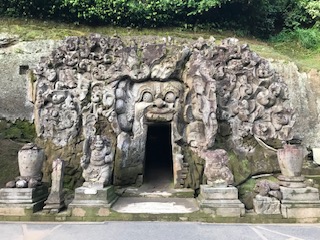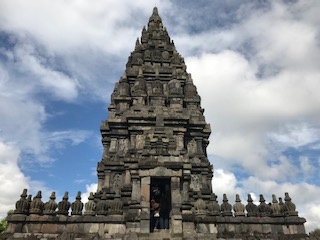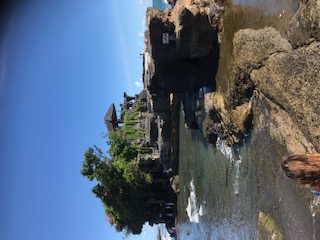Interview with H.E. Mr. Cheppy T. Wartono, Ambassador of Indonesia to Mexico.
- 14 nov 2022
- 11 Min. de lectura
Actualizado: hace 1 día

By: Lorena Meeser
What is Indonesia’s geopolitical perspective regarding its relationship with the countries in Southeast Asia?
Indonesia is the largest country in Southeast Asia, in terms of size and population. This naturally makes Indonesia very influential in the geopolitics of the region. Indonesia is one of the founders of ASEAN (Association of South East Asian Nations), founded on August 8th, 1967. The Association consists of all 10 member states of Southeast Asia countries and has become an indispensable actor and major contributor to peace, security, and prosperity in Southeast Asia and beyond.
Throughout the years, Indonesia continues to become the de facto leader of ASEAN, by its preference to ‘lead from behind. For example, during the Indo-Pacific discourse in the 2010s, Indonesia championed the concept with ASEAN-centrality in mind, namely “ASEAN Outlook on the Indo-Pacific”. It is very different than how several big countries propose the concept. Many other geopolitical initiatives in the region were also ASEAN-led initiatives. This shows Indonesia advancing ASEAN values of centrality, inclusivity, rule-based, and non-intervention as foreign policy.
Economically, Southeast Asia as a region is very interconnected. We have pursued a single market through the ASEAN Free Trade Area since 1992. We also signed the ASEAN Visa-free agreement in 2002, resulting in people from all across Southeast Asia being able to go to Indonesia, without a visa, and vice versa. Along with many other policies, through ASEAN, we built trust and confidence with our Southeast Asian friends. As a result, despite its huge size, Indonesia poses no threat to other neighbors and instead has very close relations with all countries from Southeast Asia.

What are the new investment projects and the investment perspective of Indonesian companies in Mexico for the upcoming years?
One of the investment projects in Mexico by Indonesian nationals is Indorama, which acquired one of the polymer facilities in Queretaro in 2011 and has since become one of the largest polyester producers in the world. It recently acquired the chemical products factory Oxiteno, located in Guadalajara and Veracruz. One Indonesian logistics decacorn, J&T Express, recently opened its service in Mexico. The future is bright for Indonesian investors in Mexico.
In the upcoming years, we are looking for the possibility to facilitate investment projects in the agriculture and automotive industries in Mexico. We saw that Mexico is a huge exporter in these sectors, so we are looking to penetrate the American and Central American markets through Mexico. Indonesia is especially interested in acquiring Mexican live cattle to diversify our source of cattle. At the same time, we saw collaboration potential between the automotive industries of both countries. Hopefully, we can materialize these soon.

What is the state of the relationship between Mexico, Indonesia, and the APEC?
Asia-Pacific Economic Cooperation (APEC) is a forum consisting of 21 member countries that promotes economic growth and prosperity in the Asia-Pacific region. APEC has three main pillars consisting of open trade and investment, trade and investment facilitation, and economic and technical cooperation. Both Indonesia and Mexico are very active in every meeting of APEC.
APEC has been an important platform for Mexico to ensure the Asia-Pacific market remains open for Mexican products. As a forum, it serves as a means to discuss issues behind and across the border related to trade and investment, as well as issues that pose economic threats, such as conflicts that are currently happening.
For Indonesia, APEC helps maintain regional economic stability and creates an environment that supports regional trade. It serves to build trust and mutually beneficial relationships with the partners in the region. Finally, APEC helps improve Indonesia’s capacity and competitiveness through technical training projects, capacity building, and sharing of best practices.

What can you tell us about the economic and trade relationship between Mexico and Indonesia, and what areas of collaboration can be highlighted?
Bilateral relations between Indonesia and Mexico, since their diplomatic establishment almost 70 years ago, have been going well and harmoniously. This is reflected in the mutual visits at the Head of State level, government, and non-government officials, including members of parliament. Both countries joined several international forums, such as the United Nations, APEC, G-20, FEALAC, and MIKTA (Mexico, Indonesia, South Korea, Turkey, and Australia), which support each other's nominations in international organizations.
Mexico is the third-highest trade partner of Indonesia in Latin America. Trade relations between Indonesia and Mexico have increased significantly, especially during the pandemic. In 2021, the trade between the two countries amounted to 1,6 billion USD, increasing from around 1,2 billion during 2018-2020. This year, the number is predicted to increase again, since from January to June 2022, our trade has reached 960 million USD, an increase of 36% compared to the same period last year.
However, this figure is still far from our real potential. Indonesia remains the 6th-largest ASEAN trade partner for Mexico, despite being the region's largest economy. That is why next year, on our 70th anniversary of diplomatic relations, Indonesia will hold an expo, called Expo Indonesia en Mexico, to boost this potential. We will have hundreds of Indonesian companies, investors, tourist agents, and SMEs exhibit their products here in Mexico. We will also collaborate with Mexican state governments and companies to also participate in this expo.
To Indonesia, Mexico is a gateway to the Americas that offers high market growth opportunities in many industrial sectors, as well as world-class infrastructure and logistics that have connectivity throughout the region. Mexico has grown to be the 14th largest economy in the world — $2.4 trillion — and the 11th in purchasing power, according to the World Bank. Indeed, Mexico has an open economy, and its economic development is based on free trade, as shown by the existence of numerous free trade agreements. Mexico offers an excellent opportunity for Indonesian companies to establish their operations in the region.
The main areas Indonesia is particularly interested in in Mexico are the automotive, agriculture, and medical industries. We are very aware of the automotive industry capabilities Mexico has, and the quality of Mexican agricultural products. Indonesia needs Mexico as a diversification of its source of imports. Lastly, the global pandemic reminds us that we need to build health resilience, in which Indonesia and Mexico could work together in the medical industry.

Indonesia maintains a close trade relationship with the countries of the region, particularly regarding its imports. What opportunities are open for Mexican products or for companies that want to export goods or invest in Indonesia?
In terms of trade opportunities, the food industry is one of the most important sectors in Indonesia, as a result of the size of its large population and rising incomes. The demand is greater than the supply in this sector, so the country must import large amounts of products each year. Rising incomes and urbanization will increase demand for higher-value-added food that could be supplied by Mexican companies, such as bakeries and confectionery, to name a few.
The second potential sector is the medical devices industry. Indonesia is one of the markets with the greatest growth in the medical devices industry. In the last ten years, Indonesia has quadrupled its purchases of medical devices abroad and reached 2,6 billion in 2021. This potential opens a huge opportunity for the internationalization of Mexican companies to Indonesia, to enter that market and keep the logistical and geographical advantage still competitive. The need for medical devices will continue to increase, especially after the global pandemic and the rise of medium-high incomes in Indonesia. (Source: U.S. Department of Commerce Global Trade Atlas -GTA)
The third sector is agriculture. Mexico is one of the best producers of agricultural products in the world. Indonesia is particularly interested in the live cattle production of Mexico. Indonesia largely imports live cattle from Australia and India. We are currently looking for other countries to provide the demand, including Mexico. With a population of more than 270 million, Indonesia is a very large market and provides opportunities for the Mexican cattle industry.

Who are Indonesia’s most important trade partners in the global economy?
Indonesia’s top 5 trade partners currently are China, the United States, Japan, Singapore, and Malaysia. Thailand, South Korea, and India are improving as important trade partners. As you can see, most are Asian countries, but we are improving to diversify our trade partners, especially Mexico.
Mexico is one of Indonesia’s largest emerging trading partners in North and Central America. In Latin America, Mexico is in third place as Indonesia’s biggest trade partner after Brazil and Argentina. An important thing to note is that during the pandemic, the trade between Indonesia and Mexico has increased significantly. In 2021, the trade between the two countries amounted to 1,6 billion USD, increasing from around 1,2 billion during 2018-2020. This year, the number is predicted to increase again, since from January to June 2022, our trade has reached 960 million USD, an increase of 36% compared to the same period last year
As stated before, Indonesia’s trade relations are improving with Mexico, and we are trying to tap the potential market of Latin America. Since 2019, the Indonesian government through the Ministry of Foreign Affairs organized an annual event for Indonesia and Latin America and the Caribbean (INA-LAC) Business Forum. This year, the event was held both physically in Jakarta and virtually on 18 October. Dozens of Mexican businesspeople participated in the event. It generated 16,57 million USD and a potential 162 million USD of business deals. This has and will continue to help increase the trade value of Indonesia and LAC countries, which has risen from 7,59 billion USD in 2018 to 10,28 billion USD in 2021. This annual event shows how Latin America, including Mexico, is becoming an important trade partner of Indonesia.

What would you highlight in terms of bilateral investment?
In terms of investment, Mexican investment in Indonesia is increasing every year. In 2020, 5 projects amounted to only 51,5 thousand USD. But this year, our Investment Ministry notes there are 7 projects from Mexico with a total amount of 357 thousand USD. They engaged in housing, services, trade, hotel, and restaurant sectors.
Popular Mexican investments include Kidzania and Cinepolis in Indonesia. Meanwhile, according to the Secretary of Economy of Mexico, the realization of Indonesian investment in Mexico from January – June 2022 is around US$ 25,3 million. Based on the potential that we have, I always encourage prospective investors to explore the opportunities to expand their business in the two countries.
Two major investment opportunities are emerging in Indonesia, which is e-commerce business and infrastructure. Indonesia’s e-commerce scene is quite exciting to follow. McKinsey predicted that in 2022, online commercial sales in Indonesia would reach 65 billion USD, growing eightfold from 8 billion USD in 2017.
Meanwhile, Indonesia is also building its physical infrastructures, with multiple highways, railroads, airports, and seaport projects underway. Not to mention the country is building its new capital city on the island of Borneo, called Nusantara. This opens a huge opportunity for investors to take part in the development. Good physical infrastructure can lead to Indonesia’s economic development acceleration also serves as another strong reason why infrastructure becomes an emerging business opportunity in Indonesia.

Indonesia and Mexico maintain research collaboration in various sectors, especially in the agricultural sector. Could you comment on what they consist of and what their potential is?
Indonesia and Mexico have a consultation platform in the agriculture sector named the Indonesia-Mexico Consultative Committee on Agriculture (CCA). The committee has met 3 times, with the last meeting happening before the pandemic in November 2019. We discussed much of our research collaboration and perspective on agriculture in that forum.
The collaboration in agricultural research that the two countries are interested in pursuing is in genetic improvements for oil palm, cacao, coffee, and rubber, as the main agricultural products of both countries. Indonesia also invited Mexico to conduct joint research regarding oil palm-based biofuel. Meanwhile, Indonesia is prospecting to collaborate with Mexico to increase the genetic quality of cattle in Indonesia through artificial insemination.

How has the Indonesian economy been evolving in the last few years, and what are its most dynamic productive sectors?
Indonesia has grabbed international attention in recent years by positioning itself as the next emerging digital hub. Despite economic uncertainty attributed to the COVID-19 pandemic and global tensions, the long-term trends of Indonesia’s sustained GDP growth and rapid internet penetration have encouraged the growing digital economy. More than USD 1.9 billion was raised by Indonesia’s top 56 Indonesia’s start-ups last year alone.
The digital companies that have reached the unicorn level are GoTo (GoJek - Tokopedia), J&T Express, Bukalapak, Traveloka, OVO, Ajaib, and Xendit. Among these, J&T Express, a courier or logistics service company, started to deliver its services in México in March 2022.
The government fully supports the development of this sector by setting digital transformation as one of the priority issues of our G20 Presidency. We have proven how the digital economy has supported the economic resilience of Indonesia during the global pandemic. The government is also supported by launching programs and initiatives aimed at cultivating the digital ecosystem, including venture capital funds, accelerator programs, and inviting investors to fund the digital start-ups.

What can you tell us about the group MIKTA?
Indonesia and Mexico are emerging economies in their regions, where both countries complement each other in regional and global forums such as ASEAN, APEC, FEALAC, G20, and MIKTA. MIKTA is an informal forum between the emerging economies of Mexico, Indonesia, South Korea, Türkiye, and Australia.
MIKTA is not a regional bloc, but rather a platform for flexible dialogue. MIKTA has worked on several areas of interest, including peacekeeping, trade, energy access, good governance, sustainable development, and gender equality. Indonesia is active in the MIKTA dialogue, which this year is led by Türkiye.
Next year, Indonesia will hold the presidency of MIKTA. We will continue what we brought in the G20 presidency, which is the spirit of multilateralism, as we need to maintain a global effort to address global challenges. We believe that digital transformation is crucial to achieving economic recovery, as digital sectors are proven to be able to support economic resilience in emerging countries. MIKTA has the momentum to play its part in bridging the developed and developing countries. That is why Indonesia will pursue inclusivity in MIKTA programs, through South-South and Triangular Cooperation, in development, digital, and health sectors.

What are your plans now that you are in charge of the presidency of the ASEAN Committee in Mexico City (ACMC)?
Here in Mexico, there are five embassies of ASEAN member states: Indonesia, Malaysia, the Philippines, Thailand, and Vietnam. These embassies formed the ASEAN Committee in Mexico City (ACMC). We hold the presidency of ACMC for the second half of 2022. On August 7th, we organized the ASEAN+3 Bazaar, which is a food and handicraft bazaar with a cultural performance from the ACMC countries plus three ASEAN partners: China, Japan, and South Korea. More than 1.500 people attended the event in Teatro Angela Peralta, Miguel Hidalgo, Mexico City. The Bazaar is to commemorate the 55th anniversary of ASEAN on 8th August. The visitors learned a lot about ASEAN+3 culture through dances, music, martial arts, and food. The Alcalde of Miguel Hidalgo inaugurated the event that day.
We have also organized an ASEAN business trip to Baja California. We met with governments and businesspeople of the state, especially in the manufacturing sector. We aim to promote the huge market ASEAN has, as the fifth largest GDP in the world, and an overall reliable business partner to Mexico. Lastly, we also organize a general lecture at one of the universities in Mexico, to raise awareness of ASEAN among the Mexican youths and academics.
What are the main tourist attractions in Indonesia?
Indonesian government has put five locations as priority destinations for Indonesia’s tourism. These five places are Lake Toba, Borobudur, Mandalika, Labuan Bajo, and Likupang. Lake Toba is the largest volcanic lake in the world, meaning that it was formed by a supervolcanic eruption around 70.000 years ago. Located in North Sumatra, it has 1.145 square kilometers in size, offering a picturesque view from any angle.
The second one is Borobudur, the largest Buddhist temple in the world. It was built back in the 9th century with stones and has more than 2.000 relief panels and 504 Buddha statues. Thirdly is Mandalika, a set of white sandy beaches facing the crystal-clear Indian Ocean. It is located on Lombok Island, neighboring Bali, and has several traditional villages. It also has Mandalika International Circuit, which hosted the MotoGP race back in March 2022.
The next priority destination is Labuan Bajo. Located on the island of Flores, this destination is the definition of beauty with multiple beaches, including a rare pink beach. Tourists could go on a sailing trip, hike on the hilly islands, and explore caves. The main attraction is the UNESCO World Heritage Site of Komodo National Park, where visitors can witness the endemic species of Komodo Dragon in its natural habitat.
The last priority destination is Likupang, located in North Sulawesi, which offers white beaches with secluded beaches, rich underwater life for diving, and fishing villages.
Through its geostrategic location, Indonesia could be a gateway to Mexican companies that want to enter Asia. In exchange, Indonesia could consolidate its position in North America, Latin America, and the Caribbean by partnering with Mexico. The relationship between Indonesia and Mexico has a good opportunity to grow.

Indonesian Embassy in Mexico.
Julio Verne 27, Polanco, Polanco IV Sección, Miguel Hidalgo, 11560.
Ciudad de México, CDMX
+52 55 5280 6363
Ambassador H.E. Mr. Cheppy T. Wartono.




















































Comentarios